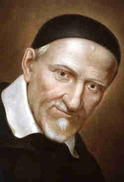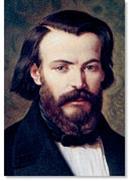
Who was St. Vincent De Paul?
His face is well known to many. You first notice the eyes: kind and loving, a piercing glance, somehow amused and formidable at the same time. A man who has found something. Many years after his death, rioting mobs in Paris smashed all the religious statues they could find, except his. He had done so much good for their ancestors, the poor and unfortunate, that they considered him a national hero. And now, hundreds of years later, more than two million people of very race, and 268 associations and congregations claim him as patron.
Vincent de Paul was not born a saint nor did virtue come easily to him. A peasant farmer's son, Vincent had a practical intelligence, a somewhat gloomy disposition, and he knew himself to be stubborn, irritable and slow moving. He would become, in time, a 'Father of his Country' and the Patron Saint of Charity.
Initially, Vincent sought to escape the poverty he knew so well as a child by becoming a priest and attaching himself to a wealthy family. But upon attaining exactly that, his life was turned upside down by an encounter with a poor penitent. This grace-filled moment was his turning point and for Vincent, as for us, there is no substitute for this direct, hands-on relationship with the poor. Experiences like this eventually gave rise in Vincent to an original vision that would govern his approach to spirituality, which is to say, his prayer, his service, his life itself.
Spirituality is the way one is energized and how one directs that energy. Vincent found it in prayer and among the poor, and focused everything on the poor in an incredibly active and productive life poured out in their service. And yet, amazingly, Vincent organized so many services and involved so many people without idealizing the poor or romanticizing work with them. He often spoke of how difficult the poor could be; how demanding, how challenging. "Only for your love will the poor forgive you the bread you give them." Although society often condemns the poor, the Father of the Poor urges us to see them as God's little ones, abandoned and neglected by system and circumstance.
His face is well known to many. You first notice the eyes: kind and loving, a piercing glance, somehow amused and formidable at the same time. A man who has found something. Many years after his death, rioting mobs in Paris smashed all the religious statues they could find, except his. He had done so much good for their ancestors, the poor and unfortunate, that they considered him a national hero. And now, hundreds of years later, more than two million people of very race, and 268 associations and congregations claim him as patron.
Vincent de Paul was not born a saint nor did virtue come easily to him. A peasant farmer's son, Vincent had a practical intelligence, a somewhat gloomy disposition, and he knew himself to be stubborn, irritable and slow moving. He would become, in time, a 'Father of his Country' and the Patron Saint of Charity.
Initially, Vincent sought to escape the poverty he knew so well as a child by becoming a priest and attaching himself to a wealthy family. But upon attaining exactly that, his life was turned upside down by an encounter with a poor penitent. This grace-filled moment was his turning point and for Vincent, as for us, there is no substitute for this direct, hands-on relationship with the poor. Experiences like this eventually gave rise in Vincent to an original vision that would govern his approach to spirituality, which is to say, his prayer, his service, his life itself.
Spirituality is the way one is energized and how one directs that energy. Vincent found it in prayer and among the poor, and focused everything on the poor in an incredibly active and productive life poured out in their service. And yet, amazingly, Vincent organized so many services and involved so many people without idealizing the poor or romanticizing work with them. He often spoke of how difficult the poor could be; how demanding, how challenging. "Only for your love will the poor forgive you the bread you give them." Although society often condemns the poor, the Father of the Poor urges us to see them as God's little ones, abandoned and neglected by system and circumstance.

What is the Society of St. Vincent De Paul?
The St. Vincent de Paul Society originated in Paris, France. In 1833, a 19-year-old Sorbonne student Frederic Ozanam met regularly with fellow Catholic students to discuss and debate the issues of the day with a group they called the 'Conference of History.' At one of their public meetings, which attracted large numbers of University of Paris students, Frederic was challenged to give examples of how the Church exhibited compassion to the poor to demonstrate that it was not just a group of privileged clergy who preached kindness to the needy but never displayed it. Unable to respond, Frederic and his friends conceded.
Shortly afterwards Frederic drew six friends together and inspired them to come together as the 'Conference of Charity' with the purpose of serving the poor of Paris. Frederic impressed upon conference members the need and importance to offer and display kindness, respect and compassion to the people they visited. In his view this was as important as the food or clothing they brought with them.
Frederic chose as patron of the Conference the 16th century cleric St. Vincent de Paul, known as the Apostle of Charity. Subsequently, the Conference of Charity was transformed into the St. Vincent de Paul Society.
As the Society grew and spread, the volunteer member groups formed in parishes became officially known as Society 'Conferences.'
The St. Vincent de Paul Society originated in Paris, France. In 1833, a 19-year-old Sorbonne student Frederic Ozanam met regularly with fellow Catholic students to discuss and debate the issues of the day with a group they called the 'Conference of History.' At one of their public meetings, which attracted large numbers of University of Paris students, Frederic was challenged to give examples of how the Church exhibited compassion to the poor to demonstrate that it was not just a group of privileged clergy who preached kindness to the needy but never displayed it. Unable to respond, Frederic and his friends conceded.
Shortly afterwards Frederic drew six friends together and inspired them to come together as the 'Conference of Charity' with the purpose of serving the poor of Paris. Frederic impressed upon conference members the need and importance to offer and display kindness, respect and compassion to the people they visited. In his view this was as important as the food or clothing they brought with them.
Frederic chose as patron of the Conference the 16th century cleric St. Vincent de Paul, known as the Apostle of Charity. Subsequently, the Conference of Charity was transformed into the St. Vincent de Paul Society.
As the Society grew and spread, the volunteer member groups formed in parishes became officially known as Society 'Conferences.'

